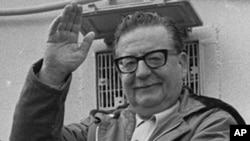A scientific investigation in Chile has confirmed that President Salvador Allende committed suicide during the September 11, 1973 coup that brought dictator General Augusto Pinochet to power.
Legal officials made the announcement Tuesday, two months after Allende's body was exhumed in order to settle the lingering question of whether he was killed or took his own life as soldiers stormed the presidential palace. Experts involved in the probe say Allende shot himself and that there is no evidence anyone else was involved. Allende's daughter, Senator Isabel Allende, said the result is a relief because now there is scientific proof to support what the family has always believed.
The exhumation was part of a widespread inquiry into 726 alleged abuses during the rule of General Pinochet, who held power from 1973 until 1990.
Questions arose shortly after the coup about how Allende died. A physician who was a member of Mr. Allende's medical team, Patricio Guijon, said he witnessed the president commit suicide with a rifle given to him by then-Cuban leader Fidel Castro. Guijon said that by the time Allende killed himself, the palace had been rocked by hours of bombings and machine gunfire.
President Allende was found dead in the palace as soldiers supporting the coup closed in and warplanes bombed the building. His family was not allowed to see the body, and there was no official investigation at the time of his death.
General Pinochet died in 2006 of a heart attack while under investigation for alleged corruption, torture and murder. His government is blamed for at least 3,000 killings of political opponents, including murders of those who disappeared.
Allende, a Marxist, won a narrow election in 1970, but his ascent to power was not welcomed by conservatives in Chile and the United States who feared that he could lead a pro-Soviet communist government. Then-U.S. secretary of state Henry Kissinger said the issues of the time were "much too important" to be left in the hands of Chilean voters, and said he saw no reason that Washington should "stand by" and let Chile turn communist.
Chile: Investigation Confirms Allende's Death a Suicide




